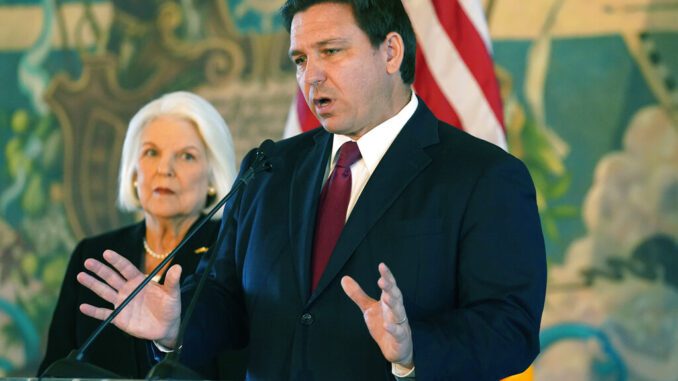
TALLAHASSEE, Fla. — In Florida, for the first time in modern history, registered Republican voters outnumber Democrats. Republican Gov. Ron DeSantis is heading into a reelection campaign buoyed by a national profile and a cash reserve unmatched by any Democratic challenger. And Republicans control virtually all of state government.
When Democrats met recently for their annual strategy conference, Annette Taddeo, a Democratic state senator running for governor, said there was a clear sense of the difficulties ahead for the party.
“Of course this fight will not be easy, but it’s about so much more than any one of us, and as Florida Democrats, we have lost so many times that donors and pundits have given up on us,” Taddeo said.
With the 2022 election approaching, Democrats are confronting a host of disadvantages as they work to rebuild campaign networks and try to reignite excitement in their party. There is a growing worry that big donors and the national wing of the party may consider Florida to be GOP territory after years of bruising losses.
Florida Republicans are coming off a string of victories that include Donald Trump’s two presidential campaigns, and have been aggressive in organizing at the local level, especially as DeSantis has gained in popularity due to his opposition to coronavirus lockdowns and mandates.
“We did not dismantle any operations; to the contrary, we continued to build on them,” said Helen Aguirre Ferré, executive director of the state Republican Party. “The power is from the bottom up. It’s not top down, and that continues to be our big commitment.”
Some have noted that there may be hesitance for Democratic donors to pour money into Florida given the party’s track record — most recently in 2020, when Trump carried the state and Republicans gained additional seats in the statehouse and in Congress, despite a $100 million infusion by former New York City Mayor Mike Bloomberg.
DeSantis announced last month that Republicans had gained a slight advantage over Democrats in the number of registered voters for the first time in state history. Over the past decade, Republicans had slowly been gaining on Democrats, and DeSantis and Republicans had made a sustained push on registration.
The most up-to-date figures from the state election agency show 5,120,076 registered Republicans and 5,095,008 Democrats. At the same time, the number of unaffiliated voters has swelled to 3.8 million. DeSantis won office in 2018 by a margin of about 32,000 votes after a key endorsement from Trump, in a year when Democrats outnumbered Republicans by more than 250,000 registered voters.
“Florida voters are choosing the Republican Party over the Democratic Party because we value freedom and liberty and reject Democrat-led government control. This milestone moment reflects years of hard work, combined with the success of our common-sense conservative policies,” DeSantis said in an email announcing the voter registration numbers.
Still, Republican strategist Susie Wiles said it’s important for the GOP to continue to organize and be bullish about registering voters.
“The assumption that it’s a reliably red state is one you should never make because the state is so dynamic, so many new people moving in and out, and it’s just a very diverse population base that’s changing all the time,” said Wiles, who ran Trump’s campaigns in Florida. “I just don’t think we as Republicans should ever stop, and the good news is that we haven’t over the last decade.”
Steve Schale, a political strategist who helped Democrat Barack Obama win Florida twice in his White House races, said Democratic registration efforts have mostly centered around presidential races.
“Registration in its own right is an organizing tool,” he said. “If your party’s out in communities, particularly in communities where we need to do better, building the kind of relationships in communities you have to build to successfully register voters, it’s going to have a kind of double-win impact.”



